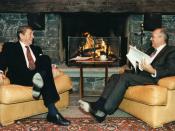In order to evaluate the United States' continually portrayed image of the Soviet Union as aggressive and interventionist, what merits assessment are the factors involved in determining what constitutes such policy. In the case of direct military intervention, an analysis of the nature of intervention is first and foremost in substantiating whether or not a nation can be defined as aggressive, however, Soviet policy towards neither Nicaragua nor Cuba during the 1980's involved such actions. What remains to be analysed is the nature of possible intervention via military and economic support, where the Soviet Union was a participant of both during the time and nations in question, and the domestic policies necessary to sustain such actions; the nature of military spending. Whether or not the Soviet Union was a global power intent on confronting the U.S. is dependent upon if the nature of this intervention was invasive or responsive to U.S.
actions. Hence, the question is to what extent was the Soviet Union intervening in order to expand itself globally and to what extent was it merely a response to the U.S. initiated involvement. Before developing responses to these questions, the context of the current tensions between the two superpowers, the nature of relevant events in the region in question and the U.S. and Soviet respective policies dealing with such tension, needs also to be briefly reviewed.
In January 1981 President Regan took office determined to do something about what he considered a growing tide of Soviet 'expansionism' and 'interventionism' which he claimed were threatening world peace. His Secretary of State, Alexander Haig, declaring "Moscow is the greatest source of international insecurity today." In 1983 Haig's successor George Schultz stated that Moscow had an "unconstructive involvement, direct and indirect, in unstable areas of the third world" and its "unrelenting efforts...


